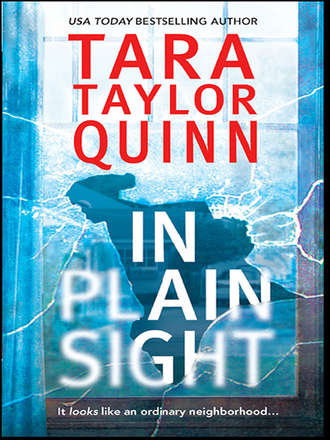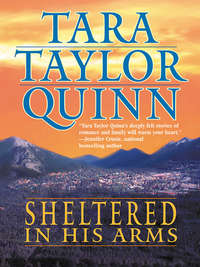
Полная версия
In Plain Sight
The file, containing all the notes Jan had collected on Lorna Zeidel, was still missing.
And Ruple had not been called. Jan was looking forward to the frozen dinner waiting at home for her.
Jan almost stopped at the mailbox as she drove in, rather than parking her car in the garage first. Not because she thought it would be safer or because she was turning over a new time-management leaf, but because she was thinking of Simon and he’d suggested she do so. Not that she expected anything from her friendly neighbor, ever, but tonight she was kind of depleted and could use some of his easy humor. Easy, because he expected nothing in return. No borrowed cups of flour. Or chats on the lawn. Or dates.
Of course, the cup of flour she’d be happy to give him. Jan grinned, as she waited for the automatic garage door to rise a few slow inches at a time, picturing him in the kitchen, making cookies with as much sloppiness as he showed in the way he dressed. She’d hate to have to clean up that mess.
The overhead light popped on as the door opened and Jan started to pull forward, but then stopped. What was that shiny substance on her garage floor? It hadn’t been there that morning.
Putting the car in Park, she got out, not frightened but tense as she moved closer. It looked like glass. There were shards everywhere. A glance at the window showed her where it had come from—there was a hole the size of a softball through the middle of the pane. Had some neighbor kid thrown a wild pitch? It happened. And it could be fixed.
Then she saw the brick on the opposite side of the garage and her heart began to pound. No way could this be part of a ball game. Whoever had thrown the heavy object through her window had done so with enough force to embed it in the drywall on the far side.
“Don’t touch it.”
Yelping as she swung around, Jan almost dropped with relief when she realized the voice was Simon’s. “I wasn’t planning to,” she told him. “This doesn’t look like an accident, and I know better than to tamper with evidence.”
“You want me to call the police?”
She shook her head. “I’ve got this cop friend downtown,” she quoted an old play, making light of the fact that she’d just come home and found her property vandalized. It was a brick through a garage window, she told herself. Certainly not life-threatening. Or even particularly damaging.
Her nervous system was overreacting. Dialing the downtown precinct, Jan told them what had happened and was grateful when they said they’d send someone right over.
“I’m sorry I scared you,” Simon said, as soon as Jan got off the phone. “When you didn’t show up at the mailbox and I saw your car in the garage, I got curious.”
“I’m glad you did,” she admitted, a little shaky. “It’s creepy standing here alone, knowing someone was here while I was gone, vandalizing my stuff.”
A window wasn’t all that much. But the guy couldn’t have known what else might be in the garage.
Of course, if he’d meant to do real damage, he’d have thrown the thing into the house, making all her possessions fair game.
“You been working on anything in particular that would piss someone off?” Simon asked, sitting beside her on the stoop in front of her house as they waited for the police. She’d called from her cell phone and was still holding it in her hand. Just in case.
A vision of the way Hall had looked at her the day before flashed through her mind. She shook her head. Twice. “Nothing out of the ordinary,” she told her neighbor. No sense in giving life to fear. It only became truly dangerous when it was given the power of acknowledgment.
Besides, the Jacob Halls of the world used things that were far more dangerous than bricks. Even as warnings.
Didn’t they?
“This ever happen before?”
Simon’s slacks were wrinkled. She liked them that way. Unlike most of the men she dealt with on a day-to-day basis, being with him felt comfortable. Relaxed.
Safe.
Now, where had that word come from?
“Uh, no,” she stammered, when she realized he was still waiting for her answer. “I’ve had letters at the office. Threats. But nothing that ever amounted to anything.”
She glanced down the street, met Simon’s gaze, and focused on the phone between her hands. “I doubt this had anything to do with my job.”
“Probably not.”
She looked back at him. Was he serious? With Simon it was hard to tell. “You really don’t think so?”
The shake of his head was decisive. “I’d guess it’s a neighborhood thing.”
She took a slightly easier breath. He was probably right. It made sense. Except that she couldn’t think of anyone nearby who might be mad at her, let alone angry enough to vandalize her house.
“Did you see anything?” She should’ve asked before. Simon was always around. Aware. How else could he know when she was at her mailbox most nights?
“Nope.”
“You sound as if you think you should have,” Jan said. There was something different about him tonight. Something deeper; more serious. Or maybe she was just coloring everything with the uneasiness she’d begun to feel. “You certainly aren’t responsible for what goes on at my house,” she told him.
“Five days out of five, my life consists of sitting at my computer staring out at an empty street. There’s a school bus that comes and goes with boring regularity, and that’s about it. Today, I’m not watching, and I might actually have seen something that could’ve been useful.” He sounded disgusted with himself.
Interesting. The man was a self-supporting published author—something a lot of people aspired to but few ever managed. He was his own boss, set his own hours, dressed however he wanted, worked from home—a dream job. His work educated thousands of people. And he thought he was useless? Who’d have figured?
Route 66 was a lot like Flagstaff itself—an innocuous two-lane road without a high-class establishment in sight, and famous anyway. And the Museum Club, with its low-grade gravel parking lot and attention-getting giant guitar sign out front, followed suit. A comfortable laid-back hangout for locals, the bar was also on many tourist lists as a famous historical site, and according to the signs Simon read as he pulled open the door, the roadhouse hosted live country-and-western bands and dancing on Friday and Saturday nights.
He neither liked country music nor dancing.
Tuesday night was karaoke night.
Simon loathed karaoke.
Slouching on a hard wooden chair at a table as far away from the microphone as he could get, Simon glanced around the half-filled room. Not a bad Tuesday-night turnout—mostly middle-aged folks in jeans, a family in one corner, a couple dressed in matching country-and-western attire doing fancy steps on the dance floor to off-key music. And a lone woman at the bar, holding her glass as if it were her only friend. She’d had a face-lift—the line behind her jaw told him that. And she dyed her own hair; she’d missed a spot on the back of her head with the platinum solution. He’d bet his computer there was no wedding ring on her finger, but that if he looked, he’d find an oversize turquoise there.
“Can I get you something to drink?”
Amanda, according to the name tag of the young woman standing at the edge of his table. Sometimes a man just got lucky.
“What’s on tap?” He gave her the slow, covertly appreciative grin that had closed more than one investigation.
With her tray balanced on a hip, Amanda listed both foreign and domestic beers. Her perfectly painted red lips moved easily, as she told him about the night’s specials. “So what’ll you have?” she ended, with a smile that would’ve locked many men’s knees—including his, nine or ten years ago.
Domestic. Simon named his brand, or rather the brand he used to prefer on tap, back when he used to go out. And watched Amanda’s butt in the tight, faded blue denim, as she made her way toward the friendly-looking blond woman behind the bar.
Nice ass.
Nice girl. He hoped. Ex-boyfriend with possible terrorist connections notwithstanding.
Pushing his glasses up, Simon pretended to look around with interest, while keeping Amanda in sight at all times. Not a hard job, as things went. Though at twenty-five she was a bit young for his taste, the woman’s slim figure and rounded breasts were visually pleasing. She was a good waitress, too—quick. She walked up to tables with a full tray and delivered everything without pausing to question who got what; friendly, but not really flirty.
“So, what’s the most famous thing about this place?” he asked, when she brought his beer.
“Hmm.” She paused as if she had all night, frowned and peered around. “I’d say the fireplace.” The silver butterfly clip that secured her long amber-streaked hair, glinted as she turned back to him. “Some of those stones were dug up hundreds of years ago. And there’s lava formations and petrified wood there, too.”
More than he’d ever wanted to know. “No kidding.” Simon gave the structure a good, long look. “You been here long?”
“Four years,” she told him. “Since I was an undergrad at NAU.”
“You dropped out?”
She shook her head. “I graduated. With a degree in English. I’m working on a master’s now.”
Bright girl. And determined enough to work while she studied.
“Got a boyfriend?”
He’d asked Jan the same question earlier that evening, when he’d insisted they look through her home while the cop was there—although he’d asked her for entirely different reasons. With Jan, even though he’d agreed with the beat cop’s assessment of a neighborhood gang-related dare, he’d been hoping to find out that she had some extra protection. She didn’t.
“Yeah, I got one,” Amanda said. And Simon took a sip of beer, batting zero for zero.
“Been together long?”
“Three years.” She grinned as she said it, letting him know that she was flattered by his interest—but not interested. Scott needed a better information source. This wasn’t a disgruntled ex.
“Too bad,” he told her with a warm glance. So much for getting her to spill her guts after work.
“Enjoy your beer,” she said, swinging around toward the bar.
“You know anywhere a guy can get some good physical training around here?” he called after her.
Simon always had plans B, C and D, as backup.
She stopped. “What kind of training?”
“I’m getting ready for level-three alpine certification from the Professional Ski Instructors of America.” He could have been. If he’d had any desire to spend his days in the cold and snow doing something he used to enjoy. Which he didn’t.
He patted his belly beneath the loosely hanging wrinkled shirt, making it clear that his garment was not hiding surplus flesh. “I’ve got great abs,” he said sheepishly, “and I can bench press twice my weight. I work out at the gym every morning.” If you could call the equipment in his spare bedroom a gym. “But I need more. Something that’ll put me above the rest.”
An asshole at a table by the dance floor whistled, and Amanda looked over her shoulder. “I might know of someone who could help,” she said, as she walked away. “Give me a couple of days.”
With that, she was gone. And so was Simon. He’d gotten what he’d come for.
4
The Zeidel file did not turn up. That could be an omen. Perhaps Jan should have done what Andrew advised and cut her losses. Not only her reputation, but the state’s and the county attorney’s hung in the balance. It was an election year. The county attorney couldn’t afford bad press or big losses. Better to let Jacob Hall go quietly on his way. After all, to her boss he was a small fish—perhaps a member of the Ivory Nation, but certainly not the leader. She’d yet to tie him directly to Bobby Donahue.
“Danny, thanks for meeting with me.” She stood, shaking the off-duty detective’s hand as he joined her at the table for two along one wall of Macy’s Coffee-house early the following Saturday morning.
“My favorite Ethiopian coffee and a beautiful woman. How could I pass that up?” he asked, settling his slightly overweight middle-aged body on the chair across from her. She was used to seeing him in uniform, and the jeans and flannel shirt were hard to get used to.
It didn’t surprise her that when it came to coffee Danny Ruple went for the strong, rough, dry kind. She bought the coffee for him at the counter, along with one of Macy’s famous muffins. And ordered a light-roast Brazilian for herself. She was picking Hailey up for breakfast as soon as she finished with the detective and she hoped that one small dose of caffeine was all she’d need until then.
“I heard about your brick encounter a few days ago,” he said, taking a sip from his steaming cup.
She wasn’t shocked by that. With only about sixty officers on the Flagstaff police force, the men and women resembled a big family; if one of them was called to the home of a county prosecutor, they’d all know about it.
“Officer Ramsey thinks it was gang related.” Much to her relief.
Danny nodded. “There’ve been three or four similar incidents south of the railroad tracks since May.”
“Any suspects?”
“We’re pretty sure we know the kids doing it,” Danny said. “But so far there’s been nothing more than minimal damage, no injuries—no real proof. We’ve brought a couple of them in for questioning, at least to let them know we’re onto them, to scare them a little. Lord knows, if we make an arrest without a full confession, fingerprints and VHS recordings, some defense attorney will start spouting rights of the accused and get him off.”
“Attorneys are not all misguided, Detective,” she said with a grin. “We’re just bound by laws that strangle us occasionally.”
“And you call on us to cut the rope and then tie yourselves up again.”
It was an ongoing debate between the two of them—in jest, but there was truth, as well. “You’re a fine cop, Danny Ruple.”
“Uh-oh, this isn’t going to be good.” He stared into his coffee, so she couldn’t read the look in his eyes. Which was probably for the best. “What happened— Hall walk again?”
“Nope.”
He studied her. “You’re actually going to make it stick this time? ’Cause I gotta tell you, Jan, I’m pretty damn sick of risking my butt so he gets a few days bed and board on the state and then returns to the street with a vendetta against the cop who booked him. I got a wife and two teenage boys who prefer it when I come home alive.”
“I know.” She nodded. Took comfort from the warmth of the ceramic mug resting in her cupped hands. “And I’m going to get him. But I need your help.”
“Of course, you do. Why else would you be buying me expensive coffee? What’ve you got?”
He thought she had a lead that needed checking. It wouldn’t be the first time Danny had spent unpaid hours off duty, assisting on a case.
“An offer.”
Narrowing his eyes, he sipped from his coffee, and said nothing.
“I’ll charge the Lorna Zeidel case and prosecute to the fullest extent of my ability.” Even though that meant starting from scratch on a cold case, a wild goose chase that—unless she pulled off a miracle—would cost the state and ultimately hurt her reputation.
“Shit.” He put down his cup with careful deliberation. The muffin she’d bought him remained untouched. “In exchange for what?”
“I need you in court a week from Monday, 8:30 sharp.”
“Why?”
She didn’t look down, as much as she was tempted to. “An evidentiary hearing to establish the validity of your confidential informant in the Hall case.”
“They want me to testify that it’s valid?”
If it was that easy, she wouldn’t have needed Lorna Zeidel. Jan waited.
Ruple threw himself against the hardwood chair, almost tipping it backward. “You want me to expose my source.”
She nodded.
“Knowing it’s the kiss of death for a cop.”
She nodded again, saying nothing as he stood.
“Do I look like a fool to you, Ms. McNeil?”
“No, Danny,” she said, still seated. “You look like a cop who’s really in it to get the bad guys—no matter what the cost.”
She had him. At least for a second. And then, leaving his coffee unfinished, he stalked out.
Would he be in touch? Or would she have to attend Hall’s hearing still wondering if her key witness—her only witness—was going to show?
“Can we not talk about our court stuff right now?”
With an effort, Jan’s smile remained intact as she fell silent. Fork in midair over her blueberry pancakes, she watched the eight-year-old across from her consume a plate of French toast without a care in the world.
“Have you changed your mind about us, Hailey?” she asked softly, holding her breath. “Because it’s okay if you have. All you have to do is say so. I won’t be angry with you, I promise.”
Heartbroken, but not angry.
The child’s short, dark curls bounced as she shook her head. “’Course not,” she said, her mouth full. “Next to Mrs. Butterworth, you’re the nicest person I ever met. Being your kid would be almost as good as there really being a Santa Claus.”
Jan wanted to hug Hailey so tight, keep her so close that no harm could ever come to her again. “You just don’t want to know about the legal proceedings?” she asked, just to be sure, respecting the little girl’s reserve.
Hailey shrugged, her shoulders bony looking beneath the blue T-shirt she was wearing with a pair of faded jeans. Her sweater was wadded beside her on the bench in the booth of their favorite diner on Route 66.
“You planning to tell me what’s bothering you?”
“Nothing.” Hailey peeked up at her. Swallowed. And did not immediately shovel another bite of food into her mouth. “I just don’t see why I should hear about the actual adoption, when they aren’t going to let it happen anyway.”
“Who isn’t?”
Had the Ivory Nation connected her to Hailey? Threatened the child? Jan’s body temperature dropped, until she realized that, once again, she was falling prey to paranoia.
“You know, the court people,” Hailey said, frowning. “Judges and CPS and all that. Derek says they probably won’t give me to anyone, but they especially won’t give me to you.”
Derek Lincoln, the twelve-year-old biological son of Hailey’s foster parents.
“Why not?”
“Derek says no one wants kids like me to have regular homes, ’cause we won’t fit in. They just keep moving us around from foster to foster, till we’re old enough to live alone.”
As quickly as Jan’s blood had frozen, it burned. “Derek’s wrong.”
“He says he’s seen it. He says it always happens that way. They talk about adoption, but every foster kid in his house just gets moved to other foster houses. He says most people don’t want us kids, ’cause we’re troublemakers and ’cause we’re too old. He says even some foster homes aren’t good, ’cause people do it for the money. He says they aren’t all like his mom, who just loves any old kid.”
“First off, you’re not any old kid, and you’re the farthest thing from a troublemaker there is, young lady,” Jan said in a voice left over from her days in juvenile court, where she’d first met and fallen in love with Hailey Miller.
Then, sensing the debilitating fear beneath the young girl’s bravado, she immediately softened. “No matter how old you get, I’m going to want you and love you,” she said, leaning over so the child could hear her clearly in the busy restaurant. “I’m not adopting just anyone, you know. I’m adopting you. Specifically you.”
Hailey’s chin puckered.
“I’ve always wanted kids some day.” Jan told the child something she’d never said out loud before. “But ever since college, I’ve worked so much I’ve lost touch with all my friends. And I never met a man I felt safe enough with to marry—you know one I believed would love me forever and ever.”
She grinned at Hailey, and felt a little better when the child smiled back.
“I was beginning to think I’d never have my family,” she continued, her voice lower as she opened her heart to this precocious and oh-so-strong child. “I don’t know why, but I never even thought about adoption—maybe because I always thought marriage would come before the kids.”
Hailey nodded, her gaze serious and on target, as if she could fully understand the complexity of the adult emotions Jan was laying before her.
Jan reached out a hand, covering Hailey’s. “Until I met you,” she continued. “Then, I could think of nothing else.”
Hailey stared at her.
And then, pulling her hand away, she stiffened. “They aren’t going to let you.”
Because she was single? She’d already crossed that hurdle, received the legal go-ahead. “Why do you say that?”
“You put away the bad people.”
Jan blinked. “Yeah. So?”
“I am the bad people.”
“Hailey Ann Miller! You are not bad!” Jan lowered her voice. “Don’t say such things.”
“Why not?” the child asked, her eyes wide and clear. “It’s true.”
“It is not true.”
“You put me away.”
Oh, God.
After all this time, all the times I prepared for this, why did it have to happen now?
“The court took you from a place that wasn’t good for you,” Jan finally said. A place worse than hell for a vulnerable little girl. Jan lost her appetite, just thinking about what she’d found at the duplex rented by Hailey’s mother. Dirty walls, rotten floors—a hole the size of a basketball in front of the only toilet, open to the foundation and dirt beneath. Mold everywhere. And a constant stream of horny men who paid Hailey’s mother, a prostitute, a pittance for the use of a body that had once been beautiful but was now weathered and ragged.
“You took me because I stole too many times and got arrested and brought to court to be punished.”
“You stole cold medicine because you were too young to buy it, and you had to help someone who’d taken care of you,” Jan said decisively. “Mrs. Butter-worth loved you. No matter how old or tired or sick she was, she took you into her side of the duplex whenever your mom was out too late or had…visitors.”
In spite of state-ordered counseling and Jan’s personal attempts to gain the girl’s total confidence, no one knew if Hailey fully comprehended what her mother was—what she’d done with the various men who’d come and gone from their home. A medical exam had shown that the child had not been molested, but no one knew what she’d witnessed during the first seven years of her life.
“Till I got taken away.” Hailey took a small bite and chewed slowly, no pleasure evident. When she’d finished, she put down her fork and looked up at Jan, her eyes glistening. “I am bad,” she said with quiet conviction. “It wasn’t just that once. I stole before, too, when Mrs. Butterworth’s checks didn’t come, but I wasn’t that good at it and I kept getting caught. And I took candy, once, just for me. It’s just that the last time they already told me no more or else, and I did anyway, and it was medicine, and now I’m taken away because I’m a troublemaker.”
“You were caught, and yes, there was some punishment because stealing is against the law…” Although, in Hailey’s case, Jan had recommended the punishment, probation, only as a scare tactic—and a safeguard, a way to keep close tabs on the little girl. It was highly unusual for an eight-year-old to be on probation.
Hailey was nodding, pushing a piece of French toast that was swimming in her syrup.
“But, Hailey, you weren’t taken away because of that. You were put in a different home because after the court found out the kind of conditions you were living in, they had to provide a better place for you, a safer place, where there were people who would shop and cook for you and not leave you alone at night. The other times, they’d called your mother and she’d cleaned up enough to satisfy the authorities when they brought you home. But the last time, they didn’t call and just went to your house. It was obvious, then, that your mother couldn’t care for you as the law requires. And the judge couldn’t leave you there, honey, especially after Mrs. Butterworth died.”











